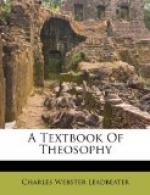Clearly then at this stage of evolution whatever tends to unity, whatever tends to spirituality, is in accord with the plan of the Deity for us, and is therefore right for us, while whatever tends to separateness or to materiality is equally certainly wrong for us. There are thoughts and emotions which tend to unity, such as love, sympathy, reverence, benevolence; there are others which tend to disunion, such as hatred, jealousy, envy, pride, cruelty, fear. Obviously the former group are for us the right, the latter group are for us the wrong.
In all these thoughts and feelings which are clearly wrong, we recognize one dominant note, the thought of self; while in all those which are clearly right we recognize that the thought is turned toward others, and that the personal self is forgotten. Wherefore we see that selfishness is the one great wrong, and that perfect unselfishness is the crown of all virtue. This gives us at once a rule of life. The man who wishes intelligently to co-operate with the Divine Will must lay aside all thought of the advantage or pleasure of the personal self, and must devote himself exclusively to carrying out that Will by working for the welfare and happiness of others.
This is a high ideal, and difficult of attainment, because there lies behind us such a long history of selfishness. Most of us are as yet far from the purely altruistic attitude; how are we to go to work to attain it, lacking as we do the necessary intensity in so many of the good qualities, and possessing so many which are undesirable?
Here comes into operation the great law of cause and effect to which I have already referred. Just as we can confidently appeal to the laws of Nature in the physical world, so may we also appeal to these laws of the higher world. If we find evil qualities within us, they have grown up by slow degrees through ignorance and through self-indulgence. Now that the ignorance is dispelled by knowledge, now that in consequence we recognize the quality as an evil, the method of getting rid of it lies obviously before us.
For each of these vices there is a contrary virtue; if we find one of them rearing its head within us, let us immediately determine deliberately to develop within ourselves the contrary virtue. If a man realizes that in the past he has been selfish, that means that he has set up within himself the habit of thinking of himself first and pleasing himself, of consulting his own convenience or his pleasure without due thought of the effect upon others; let him set to work purposefully to form the exactly opposite habit, to make a practice before doing anything of thinking how it will affect all those around him; let him set himself habitually to please others, even though it be at the cost of trouble or privation for himself. This also in time will become a habit, and by developing it he will have killed out the other.




